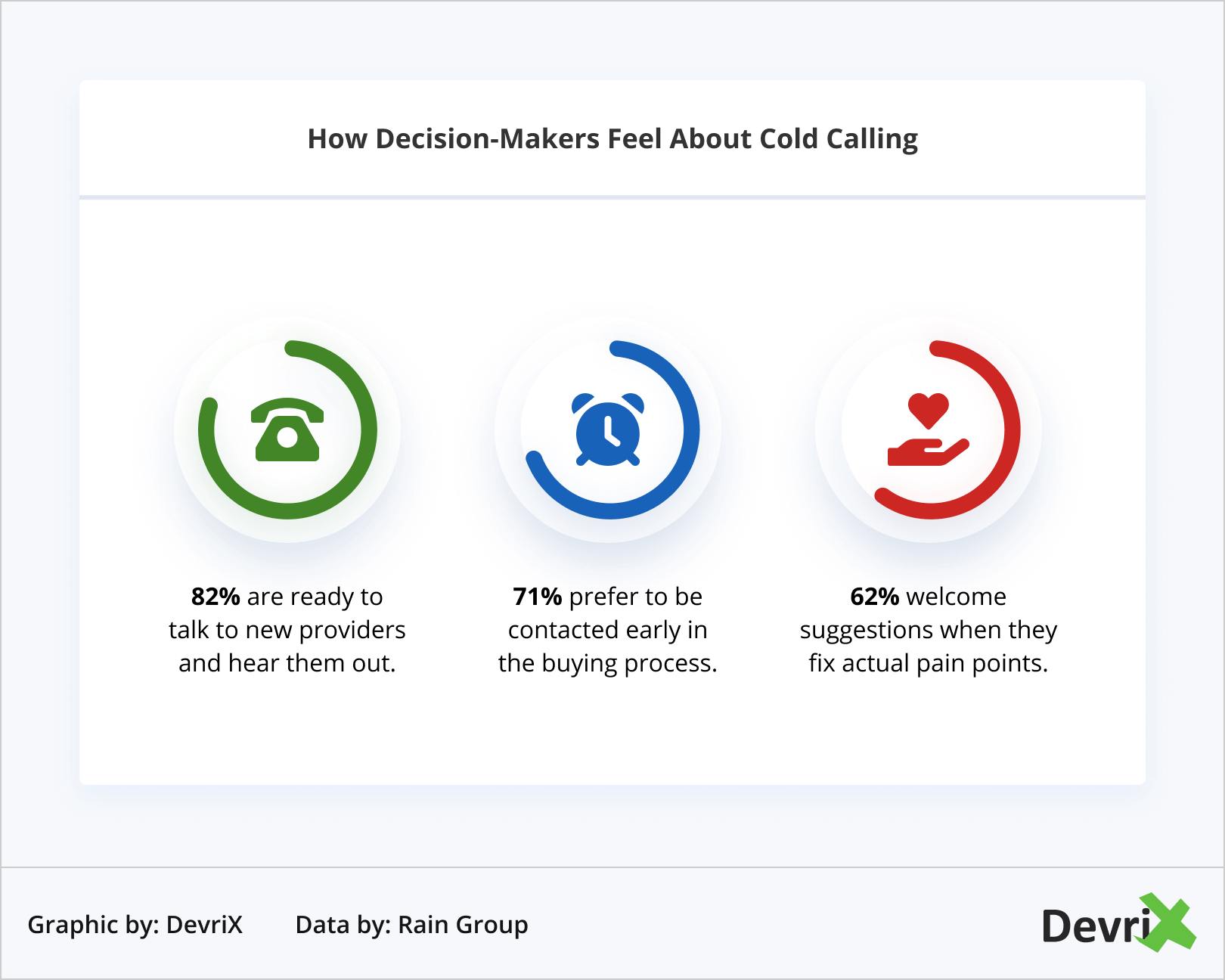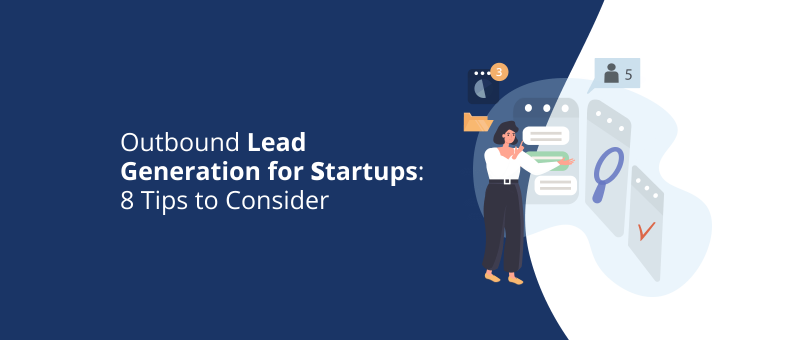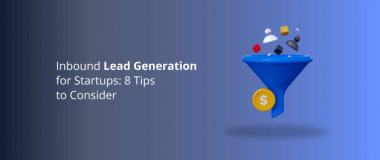The one thing that is certain when you are starting up a new business, it’s that you need clients and you need them asap. But growing a network of viable contacts is not easy and does not happen overnight. This is where lead generation comes in.
In a nutshell, lead generation is the process of introducing your business to prominent prospects and exploring various techniques to convince them to become your customers. There are, generally, two ways you can approach it – inbound and outbound marketing.
The inbound method is when you create content, distribute it online and wait for potential customers to discover your services through it. Since this strategy requires less investment, it’s often the preferred choice for startups. But inbound strategies take a long time to deliver results, and you need new clients right away.
Outbound lead generation for startups is often underestimated because it usually involves more resources. But it will help spread the word that you are in business faster and give your sales a jump-start.
Quality advertising and cold reach out can do wonders for making your name known, building your image, and generating leads quickly. Moreover, not all outbound lead generation techniques require a large investment and that makes them an affordable choice for startups.
The smartest approach is to balance inbound and outbound techniques and implement them both in your marketing strategy. But at the very beginning when you are short-staffed and working to swiftly build revenue, it’s probably best to focus on one course of action first.
In this article, we’ll explore the most lucrative outbound lead generation strategies for startups, and give you some actionable tips on how to make them work for you.
1. Define Your Ideal Customer
In order for any lead generation strategy to work – be it outbound or inbound, you have to be clear about who your ideal customers are. Moreover, as a startup, you have limited resources to invest in marketing. Targeting the right audience can be the difference between making and breaking it as a business.
Building buyer persona profiles will help you focus your efforts and ensure that you will accomplish the most satisfying results. However, make sure to do intensive research beforehand. Sometimes the customers you see as ideal might not actually be the right ones for your company. Studying the market and checking who the competition is doing business with will help you identify more lucrative opportunities and give you a headstart to success.
By targeting the right audience with outbound lead generation tactics you make sure that every penny is well-spent and that your efforts will deliver much-needed ROI.
2. Don’t Underestimate Cold Outreach
A lot of marketers feel that cold calling and cold emails are a thing of the past. But the fact is that they are still the quickest way to build a network of clients, and, as a startup, swift results are exactly what you need to take off. The key to this outbound strategy is to focus on personalization.
Cold calling’s bad reputation comes mostly from companies buying ready-made contact lists where the prevailing number of the people have little or no interest in what they are offering. However, if your list is based on the right buyer personas and you are targeting businesses that might actually benefit from your services, your chances of success will increase dramatically.
Research shows that 82% of decision-makers don’t mind cold calling and emails if they are relevant to their company’s needs and occupation. What’s more, 71% prefer to hear from sellers early on in their consideration process when they are looking for new ideas. And 62% will welcome suggestions when they provide solutions to their current problems.

By doing preliminary research on the buyers you contact, you can make sure that you are addressing their needs and offering solutions to their actual pain points. Your intel will allow you to provide on-point solutions and maintain the customer’s attention.
The cold reach-out lead generation strategy is time-consuming and requires advanced sales skills and care to detail. But when done properly, it can deliver impressive results and build you a lead database to jump-start your business growth.
3. Create Targeted Social Media Ads
Social media ads are an affordable outbound strategy to build brand awareness for your startup and acquire viable customers. It’s highly targeted and can be used both to attract new leads and warm-up ones that got cold over time.
However, before you invest resources in placing ads, make sure that you research where your potential audience loves to reside. Different cohorts have variations in their preferences, and focusing your efforts in the wrong place can be a waste of time and resources.
Also, every social media platform follows different rules. To ensure maximum engagement and optimal results, consider starting with only one of the hubs popular with your potential leads. If you don’t divide your attention between different streamlines with misleading similarities, you will have better chances of mastering one social media platform and reaping success there.
When creating your ads, it’s strongly recommended to consider performing split testing. What you believe will impress your prospects is not always what they will actually enjoy the most. By trying out different approaches and comparing the results, you will get to know your audience better and will be able to target the ads more precisely.
Once you’ve become a pro with one of the social media platforms where your audience hangs out, you can conquer the next one. This way you will save precious resources and you’ll gradually build a strong outbound social media strategy that will deliver quality qualified leads.
4. Consider Using Retargeting
It’s safe to assume that as a startup company, you are probably not that popular yet and most people don’t know who you are. Potential customers might land on your website when browsing for products similar to yours, but if they are not familiar with your brand, chances are they will leave your website to continue with their research.
Retargeting platforms such as Google Ads, Facebook retargeting, LinkedIn Ads, etc., remind people what they’ve viewed on your website by showing them relevant ads while they are browsing other websites. This way your products are brought back to mind and, since your name is already familiar to the customer, the chance of them returning to your page to review what they saw and reconsider buying is growing.
However, it’s important to notice that with the upcoming demise of third-party cookies, the future of retargeting is somewhat uncertain. Google is looking for new ways to manage and serve ads that will allow accurate targeting but will also value the user’s privacy. Although it is yet uncertain how exactly this will play out, ads are an important source of income for the search engine company so it is doubtful they won’t find a solution.
This means that retargeting will most probably remain a successful outbound strategy worth consideration, that can generate new leads for your startup and improve conversions.
5. Give Influencer Marketing a Try
There are two ways to approach influencer marketing. The first one is to build business relationships with authoritative well-known professionals in your industry who will publicly endorse your brand. The second one is to invite the same influential figures to recommend your company to their audience in exchange for financial compensation.
As a startup company, it would be best for you to do a combination of the two. Of course, the first strategy will be more beneficial for you in the long run and will cost you no money. But building valuable partnerships takes time and lead generation is something you want to gain upon quickly. That’s why you should start with weighing your options and considering your connections. If you can’t think of anyone who would be willing to take you under their wing, and you can afford it, investing in influencer support might be worth it.
Make sure, however, to consider carefully those who you reach out to. If the person who endorses your business has a questionable reputation, this can hurt your credibility and, respectfully, theirs as well.
A recommendation from a respectable public figure in your niche can put your name out there and make your business known to a highly targeted audience of prospects. This strategy can help you generate many qualified leads and will make your name better known in your industry circles.
6. Co-Host Digital Events
Events are another good way to put yourself out there and introduce your business to potential buyers interested in your niche. Naturally, new businesses rarely have the resources to organize an event. But there are alternatives that would allow them to get around this problem and still gain some of the benefits that come from such publicity. Like co-hosting or partnering with the main hosts to deliver services they specialize in.
Joining forces with established companies in your industry that organize popular events and help in the planning and implementation.
However, to acquire the desired results, make sure to choose events where you can deliver value and make your brand and products shine. Also, don’t forget to negotiate where and how your name and logo will be included in the promotional campaign, as this is the most important part in order to generate leads.
7. Present Your Business at Trade Shows
Speaking of events, trade shows are a classical outbound strategy for lead generation and building B2B connections. Although public events of all kinds are still on hold in most parts of the world due to Covid restrictions, things will sooner or later go back to normal. And after such a long pause, it’s a reasonable prognosis that business fairs will be back in full swing and companies will be more excited than ever before to meet up face-to-face.
Trade shows provide valuable experience to startup companies. There often is both a B2B and a B2C segment where highly targeted professionals meet and network.
New businesses can leverage this environment to:
- Introduce their business and products.
- Catch up on industry trends.
- Get to know the competition.
- Meet new partners.
- Attract clients.
- Make valuable contacts.
- Find new investors.
Industry fairs have participation fees that might seem steep for startups, but in most cases, the price is worth it.
Consider reviewing the different types of participant passes and levels of access. Even if you can’t afford the all-inclusive package, the low-cost ones might still provide access to enough opportunities to make the visit worth your while.
8. Consider Investing in CRM Software
A Customer relationship management (CRM) solution keeps your contacts organized and builds profiles for prospects and leads. All the information is neatly gathered in one place where team members from different departments can access it.
The software can be linked to different channels where it can monitor the leads’ behavior and score them for you. It can also be set up to notify you when they reach a certain milestone or perform an action. This enables you to contact potential clients with the right message at the right moment and improves your chances of sealing a deal.
A CRM can be a powerful tool for lead generation for startups and established businesses alike. It is indeed a pricey solution so regardless of when you decide to try it out, it is still a tactic worth considering.
Recap
Lead generation is the first step to making sales and increasing revenue. Startup companies can utilize different strategies and techniques to speed up the process, and the outbound approach is the quickest way to do it.









